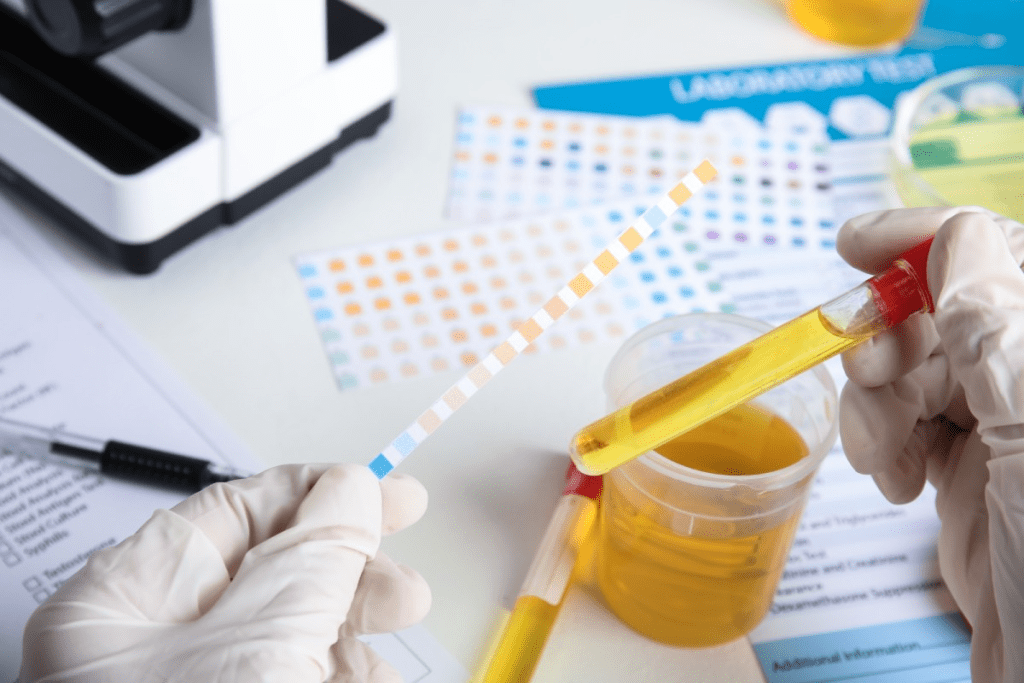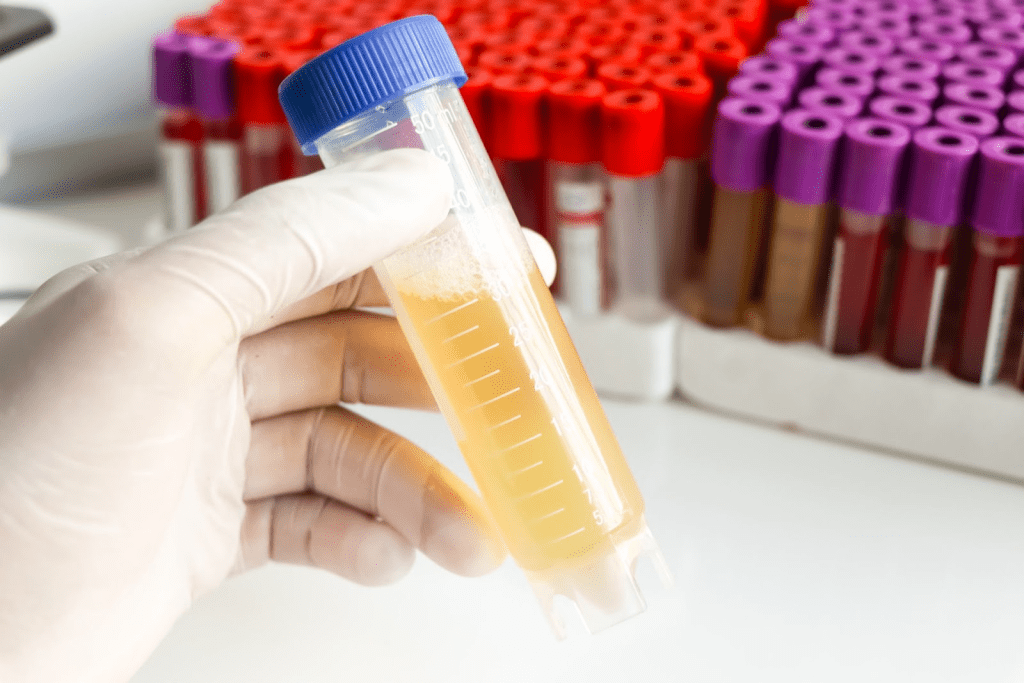Last Updated on November 25, 2025 by
To ensure an accurate result, learn what medications, foods, and drinks you must avoid before your test to get a clean urine sample in 24 hours.
When you’re getting ready for a 24-hour urine test, it’s key to know what to do. A clean urine sample is essential for spotting health issues.

To get accurate results, stay away from things that can mess with your test. The Clinical and Laboratory Standards Institute (CLSI) says urine samples should be tested within 2 hours or kept cold at 4 °C for up to 24 hours.
We’ll show you what to skip before your urine test. This includes physical activities, foods, and meds that can affect your test. By sticking to these tips, you help your doctor get a clear picture of your health.
Urine tests are key in diagnosing health issues. They help doctors check on patients’ health and spot problems like infections and kidney disease. These tests are also used to monitor diabetes.

A urinalysis looks at urine’s appearance, concentration, and content. It tells a lot about a person’s health. Doctors often use it for routine checks or to find the cause of symptoms.
There are many urine tests, each for different health aspects. A routine urinalysis checks for protein, glucose, and blood cells. These signs can point to health problems. A 24-hour urine test measures substances over 24 hours. It shows how well the kidneys are working and metabolic processes.
Special urine tests can find infections or kidney stones. Knowing about these tests helps patients understand what to expect and how to prepare.
Getting ready for a urine test is key for accurate results. Foods, meds, and activities can skew the results. We tell patients what to avoid before the test to get the best results.
Knowing about urine tests and preparation helps patients help their doctors. Accurate samples lead to better diagnosis and care.
Before a urine test, it’s key to know how exercise can affect your results. Intense workouts can change your urine’s makeup, leading to wrong test results.

Hard exercise can change your urine’s chemicals. For example, too much exercise might make your urine show more protein and ketone bodies. This could be seen as a sign of health problems by doctors.
Studies show that hard exercise can raise protein levels in urine. This might look like kidney damage or disease.
Exercise can lead to false positives for kidney problems. For instance, ketones in urine might mean your body is using fat for energy. This could be seen as diabetes or ketoacidosis.
To avoid false positives and get accurate results, stick to moderate physical activity 24 hours before your test. Avoid hard exercise to make sure your test reflects your health.
Certain foods and drinks can change your urine test results. It’s important to watch what you eat and drink before the test. Your diet can make your urine look different, leading to false positives or other errors.
Some foods can change your urine’s color. Eating beets can make your urine pink or red. Rhubarb can also darken your urine. These changes are usually safe but can be surprising.
It’s not just about color. Foods like asparagus can make your urine smell strong. These changes might not affect test results directly. But they can show the presence of certain substances.
Eating a lot of meat can make your urine more acidic. On the other hand, eating more milk or vegetarian foods can make it more alkaline. These pH changes can impact some urine tests, like those checking for specific ions or compounds.
Some foods contain substances that can be mistaken for drugs in tests. For example, poppy seeds in foods can lead to false positives for opiates. This is because they contain morphine and codeine.
Drinking enough water is key for a clean urine sample. We recommend drinking water to keep your urine pale yellow or clear. But drinking too much can dilute your urine, affecting test results.
In the 24 hours before your test, avoid drinking too much water. Instead, drink water regularly to stay hydrated. This helps keep your urine at the right concentration for accurate test results.
To get accurate urine test results, it’s key to know which medications and supplements to avoid. Many drugs, including nonprescription ones and supplements, can mess with urinalysis results. Always tell your healthcare provider about any meds or supplements you’re taking.
Some prescription drugs can change urine test results, leading to wrong diagnoses. For example, antibiotics like rifampicin can turn your urine color. Diuretics can also change urine concentration. Talk to your healthcare provider about your meds to know how they might affect your test.
OTC meds and supplements can also mess with urine test results. For instance, too much vitamin C can cause false-negative glucose test results. Some herbal supplements can also change urine chemistry, leading to wrong test results.
Be careful with:
If you’re on meds your healthcare provider needs to know, tell them before your urine test. Make a list of all your meds, including how much and how often you take them. This helps your healthcare provider understand any effects your meds might have on your test results.
When sharing your meds, include:
Being open about your meds helps your healthcare provider make better decisions based on your test results.
Collecting urine samples correctly is key for getting accurate test results. It might seem easy, but there are specific steps to follow. These steps help make sure your urine test results are reliable.
Here’s how to collect a urine sample correctly:
To get accurate urine test results, avoid these common mistakes:
A 24-hour urine test needs all urine collected over 24 hours. Here are some special tips:
By following these tips and avoiding common mistakes, you can get accurate and reliable urine test results.
How a urine sample is handled after it’s collected is very important. It makes sure the sample stays good for accurate tests.
The Clinical and Laboratory Standards Institute (CLSI) says urine samples should be tested within 2 hours. This is because light and heat can damage the sample, leading to wrong test results.
Key considerations within the 2-hour window include:
If a urine sample can’t be tested in 2 hours, it needs to be stored right. Refrigeration at 4 °C is best for up to 24 hours.
Proper storage involves:
At Liv Hospital, we follow strict rules to keep urine samples safe. Our lab techs are trained to handle samples carefully, following CLSI and our own rules.
Our protocols include:
To get accurate urine test results, it’s important to follow the tips in this article. Being aware of physical activities, foods, medications, and how to handle the sample is key. This helps doctors make the right diagnosis and treatment plan.
A clean urine sample in 24 hours is essential for good test results. We’ve talked about what to avoid before a urine test. By not doing intense exercise, eating certain foods, and avoiding some medications, you can get a clean sample.
It’s also important to collect and handle the sample correctly. By following our guide and storing the sample right, you help get accurate results. Getting accurate urine test results is a team effort between you and your healthcare provider.
A 24-hour urine test measures substances in your urine over 24 hours. It helps diagnose and monitor health issues like kidney disease and metabolic disorders.
Some foods can change your urine’s color or composition, affecting test results. Avoid foods high in sugar, salt, or artificial coloring. Also, skip foods that can turn your urine color, like beets or berries.
Drinking coffee in moderation usually won’t affect your urine test. But, it’s best to check with your doctor. Caffeine can make you urinate more, changing urine concentration.
Usually, you don’t need to fast for a urine test. But, some tests might require special diets. Always ask your doctor about what to do before your test.
The urine needed varies by test type. For a basic urinalysis, one sample is enough. But, a 24-hour test requires all urine for 24 hours.
A 24-hour urine test shows a lot about your health. It checks for kidney function, metabolic health, and more. It looks at substances like creatinine and protein in your urine over 24 hours.
To collect a 24-hour urine sample, you’ll get a special container and instructions. Start by throwing away your first urine of the day. Then, collect all urine for the next 24 hours, including the first urine of the next day.
Instructions for a 24-hour urine test vary. You’ll usually need to collect all urine for 24 hours. Keep the container cool and return it to the lab or doctor within a certain time.
Yes, intense exercise can change your urine, leading to false positives for kidney issues. Try to avoid hard workouts before your test to get accurate results.
Evaluation of the appropriate time period between sampling and analysis in urinalysis. (2016). Clinical Biochemistry (Online). https://www.ncbi.nlm.nih.gov/pmc/articles/PMC4783094/
Specialty: Urine Collection and Transport (24 Hour). ARUP Laboratories. (n.d.).https://www.aruplab.com/testing/resources/specimen/urine“Diet/Drug Restrictions Prior to 24 Hour Urine Collection. (n.d.). HorizonNB Laboratory.https://horizonnb.ca/wp-content/uploads/2021/10/HHN-0840-Diet-and-Drug-Restrictions-Prior-to-24-Hour-Urine-Collection-Web-Version-1.pdf
Subscribe to our e-newsletter to stay informed about the latest innovations in the world of health and exclusive offers!